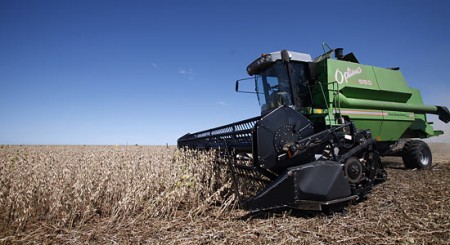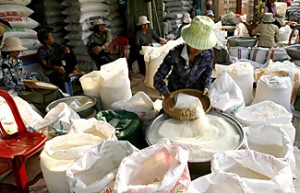
A farmer harvests soy beans on the outskirts of Gualeguaychu, north of Buenos Aires.(Andres Stapff/Reuters)
Soaring food prices and global grain shortages are bringing new pressures on governments, food companies and consumers to relax their longstanding resistance to genetically engineered crops.
In Japan and South Korea, some manufacturers for the first time have begun buying genetically engineered corn for use in soft drinks, snacks and other foods. Until now, to avoid consumer backlash, the companies have paid extra to buy conventionally grown corn. But with prices having tripled in two years, it has become too expensive to be so finicky.
“We cannot afford it,” said a corn buyer at Kato Kagaku, a Japanese maker of corn starch and corn syrup.
In the United States, wheat growers and marketers, once hesitant about adopting biotechnology because they feared losing export sales, are now warming to it as a way to bolster supplies. Genetically modified crops contain genes from other organisms to make the plants resistance to insects, herbicides or disease. Opponents continue to worry that such crops have not been studied enough and that they might pose risks to health and the environment.
(Genetically modified crops have been studied long enough to know that GM food weakens the immune system within days, increases the cancer risk dramatically etc. – The Infinite Unknown)
Read moreIn lean times, biotech grains are less taboo










 Llosa del cavall reservoir in Sant Llorencs de Morunys, north of Solsona
Llosa del cavall reservoir in Sant Llorencs de Morunys, north of Solsona


